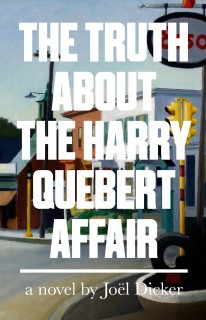Book Review: “The Truth About the Harry Quebert Affair” — Beware the Hype
The Truth About the Harry Quebert Affair is a long but fast-paced book that walks the line between airport novel and true work of literary fiction.
The Truth About the Harry Quebert Affair by Joël Dicker. Translated from the French by Sam Taylor. Penguin, 656 pages, $18.00.
By Troy Pozirekides
It’s hard to imagine a novelist these days who could “wander the streets of Manhattan, causing a stir” as he passed by, but that’s just what happens to Marcus Goldman, early on in Joël Dicker’s new book, the Truth About the Harry Quebert Affair. Dicker has himself been causing a stir of late; his novel’s translation rights have been sold in 32 countries. The American edition, translated from the original French by Sam Taylor, has been called “unimpeachably terrific” by the New York Times Sunday Book Review, its author a “literary wunderkind” who “doesn’t even have the decency to write dreck.”
That’s high praise for a 29 year-old novelist, but Dicker’s book, at least on the surface, would seem up to the task. Its narrator, Marcus Goldman, is himself a literary phenom who, after the metoric success of his first book, finds himself faced with the writer’s disease. Marcus is blocked, so he seeks solace in the company and wisdom of his mentor, the rough and tumble Harry Quebert, whose own book The Origin of Evil made him a household name upon its publication in the 1970s.
Marcus’s brief sojourn to Harry’s seaside cottage in fictional Somerset, NH doesn’t have the expected result, however — he still can’t find something worth writing about. He returns, tail between his legs, to New York, to face his publishers and risk breaching the stipulations of his contract. But soon after, shocking news comes from Somerset: Harry Quebert has been arrested on suspicion of murder, after a body has been found buried in his backyard.
Marcus returns to Somerset, ostensibly to clear his mentor’s name, but also to dredge up material for a potential new book. We watch as he plays detective (along actual New Hampshire State Police detective Perry Gahalowood, who is straight out of a buddy cop movie) but no real sleuth’s insight is ever required of him. Marcus is the constant beneficiary of bumping into the right people at the right time, and we gradually get a basic outline of what’s happened: the girl who was buried in Harry’s yard is one Nola Kellergan, who went missing at the age of fifteen in the summer of 1975, just before Harry published The Origin of Evil, which is about the impossible love affair between an older man and a young girl.
The deck seems to be stacked against Harry from the outset; in addition to the damning testimony of The Origin of Evil — now facing censorship from the schools and libraries that once praised it as a quintessential work of American fiction — Nola was found buried with a typewritten manuscript of the novel, with the inscription “goodbye my darling Nola” written right on the cover page. Marcus, however, isn’t convinced. He sets himself to discovering what really happened on August 30, 1975, the date of Nola’s disapperance, deadlines and all other concerns be damned.

Author Joël Dicker — reading “The Truth About the Harry Quebert Affair” is like being pummeled in a boxing match.
The result is a long but fast-paced book that walks the line between airport novel and true work of literary fiction. Unfortunately, this ambivalence of form damns The Truth About the Harry Quebert Affair from the beginning. It’s fine to write a well-plotted and unchallenging mystery story, and Dicker has certainly done that, but he makes his narrator an honest-to-god novelist, and in doing so leaves his book open to a world of intensely amplified literary scrutiny. Under such conditions, one finds it hard to believe that Marcus, a man “destined to become one of our great writers,” would clumsily proclaim “little did I know that a dramatic event was about to change everything,” just before he hears of the charges against Harry. It’s the constant tug of war between Marcus’s oft-asserted status as a gifted writer and the blunt, cliché-ridden nature of his narration that makes pretty well near every line of The Truth About the Harry Quebert Affair so terribly hard to countenance.
The subpar quality of Dicker’s prose, so consistently laughable that it can’t simply be blamed on a poor translation (“Fellatio had infiltrated the highest echelon of public life. The affair was on everyone’s lips, so to speak”), is one thing, but what is most troubling about the book is exactly that which has earned it its glowing praise: the staggering number of plot twists that occur in the novel’s denouement. Good mystery stories keep us guessing, by way of steadily introducing new suspects whose appearances complicate the otherwise simple question that has become a name for the entire genre: “whodunnit?” The Truth About the Harry Quebert Affair does that, but then doesn’t trust us to keep track of them. Three times in the novel’s middle 200 pages are we given outlines — built-in CliffsNotes, really — not only of all the potential criminals, but of their assumed roles in Nola’s disappearance: “Several important questions remained unanswered, and Gahalowood wrote them on large sheets of paper.” Moments like these are at best an endorsement of laziness on the part of the reader, at worst a sign of an author’s contempt. Both have no place in this book, which so clearly aspires to the condition of ‘great’ literature — each chapter beginning with a snippet of Harry’s advice on writing.
When giving the young Marcus his pointers on writing, Harry likes to bring up boxing. But reading The Truth About the Harry Quebert Affair seems to me much more like a boxing match. The endless succession of clichéd phrases (of the “vanished into thin air” variety), the narrative inconsistencies (in an interview, Harry asks Marcus to turn off his recorder, a command that is followed by three pages of seemingly verbatim dialogue), and the erratic plot twists all work to knock the reader into submission. Great books (written by people who cause no stir when they walk down the street) exist for many reasons, one of which is to give us pause. In reading this one, I couldn’t help but speed to the end.
Troy Pozirekides is a freelance writer and critic. He divides his time between Boston and Los Angeles, and his writerly pursuits between literary fiction and screenplays. He is also a musician, playing trumpet and guitar. Follow him on Twitter at @tpozirekides.
Tagged: Joel Dicker, Swiss Literature, The Truth about the Harry Quebert Affair


Yes. Really tired of boxing metaphors for writers.
It’s not boxing.